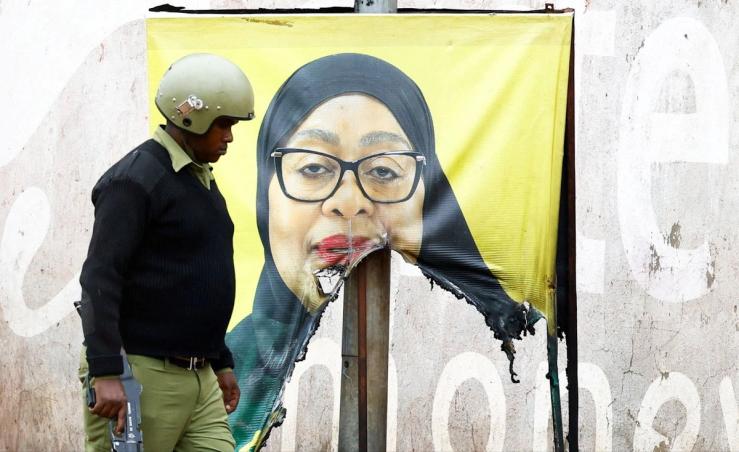The News
Provisional results from Tanzania’s electoral commission showed President Samia Suluhu taking an early lead in the Oct. 29 polls, even as protests persisted over the blocking of opposition leaders from the ballot.
Suluhu is expected to secure a five-year term but with credibility concerns lingering over the elections. International rights groups have criticized the electoral process which has been marred by low voter turnout, a night curfew and internet shutdown as protesters have taken to the streets of major cities for the third day since election day.
At least four people have been killed since protests broke out in the commercial capital Dar es Salaam and later at the border town of Namanga, with the government shutting down internet access and police declaring a curfew.
Demonstrators are demanding the invalidation of the elections over the months-long detention of opposition leader Tundu Lissu, which kept him off the ballot. Many protestors rallied online on platforms including X Spaces after downloading VPNs to circumvent the shutdown.
“That kind of digital mobilization is part of the reason why the government chose to blanket block the internet access,” Omar Said Shabaan, chief counsel of Tanzanian opposition party ACT Wazalendo, told Semafor.
Shabaan told Semafor that the situation represented “an erosion of trust” in the ruling Chama Cha Mapinduzi (CCM) party and its leader Samia Suluhu whom he said “were not ready to be challenged at the ballot”. ACT Wazalendo’s presidential candidate Luhaga Mpina was also barred from the ballot following an objection from the attorney-general.
In this article:
Know More
Protesters continue to organize online while access to major TV stations has also been cut off by authorities.
In addition to Lissu’s release, some protesters are demanding the formation of a transitional government, constitutional changes and a free and fair election.
Many of the protesters are frustrated Gen Z and younger millennial Tanzanians, drawing comparisons to the wave of unprecedented Gen Z protests in countries including Kenya, Madagascar and Morocco.
The election chaos represents the culmination of an increasingly tarnished human rights record by Tanzania in recent months, with all eyes on international observers and countries following the polls. The detention of Lissu in April on incitement and treason charges fueled public uproar against the ruling party. The detention and torture of East African activists in Tanzania including Kenya’s Boniface Mwangi and Uganda’s Agatha Atuhairwe has also led to criticism of Suluhu including from global rights bodies.
Martin’s view
The election chaos in Tanzania is only but a symptom of the actual problem of a increasing assault on basic democratic freedoms and human rights in the country. This problem isn’t unique to Tanzania but is prevalent across several countries in East Africa and beyond. Just this month large sections of voters were effectively disenfranchised as major opposition candidates in Cameroon and Côte d’Ivoire similarly failed to make it to the ballot.
In Tanzania, the treatment of Lissu by the government has proven to be a step too far. Frustrated youth have ensured that the election’s credibility will be questioned even when Suluhu is inevitably declared president, as will her legitimacy.
Lissu, who was in 2017 shot several times and had to flee to exile, is arguably the most important figure in Tanzanian politics today. The big question now is whether Suluhu and CCM make concessions to opposition leaders and protesters in search of legitimacy, or engage in further repression against perceived opponents. The role of the international community as Tanzania plots a new future will also be worth watching.
Notable
- Continental and regional bodies, including the African Union, have been criticized for failing to address human rights abuses in Tanzania ahead of the election.


